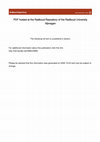Papers by Bertjan Verbeek

Oxford Research Encyclopedia of Politics, Sep 28, 2020
The Suez Crisis of 1956 is a perfect case for crisis research in the domain of international rela... more The Suez Crisis of 1956 is a perfect case for crisis research in the domain of international relations: the events leading to an Israeli attack on Egypt and an Anglo-French military invasion in the Suez Canal area seriously endangered regional and global peace and security. It also had major long-lasting consequences, notably the end of British influence in the Middle East, the expansion of the Cold War into that region, severe damage to the Western alliance, and, related to that, the acceleration of European integration as well as the development of the French nuclear bomb. An analysis of the Suez Crisis allows for a useful comparison of objectivistic and subjectivistic conceptualizations of the notion of crisis. This bears out that different actors attached, and still attach, different meanings to the events of 1956. Consequently, they look back on, and evaluate, the crisis in different terms. Also, Suez invites a confrontation of rationalist and constructivist approaches to the crisis phenomenon in the international relations literature. Furthermore, it invites an assessment of different approaches to foreign policy crisis decision-making, as they are employed in the comparative foreign policy analysis literature. In addition, the crisis serves to dissect important methodological issues regarding crisis research, particularly regarding causality and the issue of the decision unit. Finally, Suez offers insights into the specific legal and normative constraints faced by democracies seeking to go to war.
Oxford Research Encyclopedia of Politics, May 29, 2020
Since the Maastricht Treaty (1993), subsidiarity has guided the political process surrounding the... more Since the Maastricht Treaty (1993), subsidiarity has guided the political process surrounding the distribution of competences between administrative layers in the European Union (EU). The EU’s subsidiarity regime affects the politics and governance of the EU, because the notion of subsidiarity allows for continuous negotiation over its practical use. The constant battle over subsidiarity implies that the notion changes its meaning over time and alters the power relations between different actors within the EU. Since the Lisbon Treaty (2009), subsidiarity has mainly strengthened the position of member states at the expense of the Commission.

Oxford Research Encyclopedia of Politics, 2021
In crisis-ridden times, when events like the COVID-19 pandemic, acts of terrorism, and climate ch... more In crisis-ridden times, when events like the COVID-19 pandemic, acts of terrorism, and climate change-induced crises are making constant headlines, states, businesses, and individuals alike look to international organizations (IOs) to help them weather the storm. How can the role of IOs be better understood in the context of crisis and crisis management? For a start, it requires a distinction between objective and subjective crisis perspectives in studying IOs. From an objective perspective, IOs are examined as unitary actors that have the aim of contributing to the stability of the international political system. On the other hand, in a subjectivistic approach, IOs’ actual crisis management is the focus. In this perspective, the emphasis is on an IO’s internal life, that is, its perceptions, bureau politics, and decision-making. In the exploration of these issues, IOs can no longer by studied as entities but have to be unwrapped into small groups and individuals, such as members of...
Routledge, Jul 31, 2004
Item does not contain fulltex
Oxford Research Encyclopedia of Politics, 2020
Since the Maastricht Treaty (1993), subsidiarity has guided the political process surrounding the... more Since the Maastricht Treaty (1993), subsidiarity has guided the political process surrounding the distribution of competences between administrative layers in the European Union (EU). The EU’s subsidiarity regime affects the politics and governance of the EU, because the notion of subsidiarity allows for continuous negotiation over its practical use. The constant battle over subsidiarity implies that the notion changes its meaning over time and alters the power relations between different actors within the EU. Since the Lisbon Treaty (2009), subsidiarity has mainly strengthened the position of member states at the expense of the Commission.

Acta Politica, 2018
This article investigates the impact of individual traits of political leaders of small states on... more This article investigates the impact of individual traits of political leaders of small states on their relative success in conducting foreign policy. Theoretically, it seeks to establish the conditions under which specific leadership traits are conducive to different styles in foreign policy. Empirically, it applies Leadership Trait Analysis in order to formulate expectations regarding the foreign policy styles of three leaders in Luxembourg's foreign policy (Joseph Bech, Pierre Werner, and Gaston Thorn). Subsequently, it offers an analysis of the three leaders' foreign policy towards a vital issue in Luxembourg's foreign policy in the 1960s and 1970s: the location of newly founded European institutions. The article confirmed the expectations regarding the three leaders' foreign policy style: Thorn's failure to secure the European Parliament for Luxembourg City, and that the successes of Bech and Werner in securing other institutions can be accounted for by individual differences between them. Keywords Luxembourg (foreign policy) • Leadership trait analysis • Seats of European institutions • Small state foreign policy * Bertjan Verbeek
Aanpassing onder druk, 1997

tions between men and women with respect to the division of labour within and outside the family ... more tions between men and women with respect to the division of labour within and outside the family reignty and autonomy may under certain condi-(paid work and unpaid care) as well as the increasing tions and to a certain extent in reality provide new differentiation of the life cycle and o f careers have opportunities that, in fact, augment the national strongly challenged the gendered assumptions of room for policy-making. Finally, the extent to many welfare state arrangements. Fifthly, political!) which common pressures result in common outrecognized systems of interest intermediation have historcomes depends on a range of intervening variables ically accorded a firm social and economic basis to that vary from country to country, such as the the welfare state, but have now considerably eroded, openness of the national economy, the type ofpo-sometimes as a result of deliberate politics, but Iitical system, the type of social and economic generally as a result of the weakened position of the system, the extent to which changes in one policy organized labour movement. Sixthly, the political areas set incentives for change in adjacent policy arcoalitions that once supported the welfare state have eas, and on the precise nature of the emerging Eu-either weakened or have broken down entirely, ropean social policy regime itself. Moreover, broad popular support for the welfare Transnational factors are not alone in putting state may very well be on the verge o f collapsing as pressure on European welfare states. They are con fronted with a pennanent necessity to adjust their institutional arrangements to changing demograph ic, social and economic circumstances. The condi-political actors who defend the legacy of the welfare state increasingly fail to do so and those who opt for rolling back the welfare state considerably have no answer to new risks and needs that partly result from. tions under which the postwar welfare state___ the very politics of retrenchment. In this article we emerged as well as the assumptions upon which so cial policies were formulated and implemented no _________________________________________ longer seem to obtain. In this sense, there exist at ~ Tr Tr t ,-, f ... r T • ,. ..... D r. K. van Kersbergen en dr. B. V erb eek zijn als Umverleast six common pressures m addition to transna-sifair Docent verbonden aan de Vakgroep Polidcologie en tional forces. Firsdy, the relatively stable balance Bestuurskunde van de Vrije Universiteit te Amsterdam, De between generations is challenged by an ageing popu-Boelelaan 1081c, ioSi HV Amsterdam K. van Kersbergen and B. Verbeek The future of national social policies In the context of European integration 21 concentrate on analysing the pressures put 011 national systems; 3) competition between national tional governments1 social policies by the related systems for mobile production factors, A supranadevelopments of globalisation of the economy and tional, European level of social policy exists, but has European integration. 2 Different fields, opposite views not replaced the national welfare state and is restrict ed in tenus of authoritative capacities. However, national social policy is affected by integration: 'A supranational social policy regime limited to mar-Leading theories from the fields of international po~ ket-making, forces national social policy to devote litical economy, international relations and Europe-significant political resources to the opening of na an integration argue that transnational processes like tional borders (...). With market integration laying globalization and European integration are funda-national welfare states open to unprecedented commentally limiting the autonomy and even the sove-petitive pressures, nationally confined economic reignty of national states and of national policy-and social policies become dependent on the volmaking. The literature on globalization stresses that untary cooperation of mobile production factors, national states (and therefore national welfare states) forcing governments to rely more and more on the have lost to a large extent their autonomy and effi cacy in policy-making. An example is the contem porary functionalist argument, as summarized by Hout (1996: p. 166): 'In every political system, a number of functions have to be performed. Under the influence of (for instance, technological, orga nizational, or financial) developments external to the political system, the national political authorities will experience more difficulty in the transmission of their decisions into an effective "allocation of val»

T he Netherlands boasts a wide array of populist Radical Right parties, from the Freedom Party (P... more T he Netherlands boasts a wide array of populist Radical Right parties, from the Freedom Party (PVV) and Forum for Democracy (FvD) to Correct Alternative 2021 (JA21). To complicate matters further, the left-wing Socialist Party (SP) is also considered a populist party. Mirroring the diversity of responses to the Russian invasion of Ukraine in the rest of Europe, Dutch populist parties have reacted in myriad ways. Whereas the PVV condemned the Russian invasion, the FvD remained highly supportive of Putin. Interestingly, while many European populist Radical Right leaders, following public opinion, pivoted away from support for Russia, the FvD has maintained its support for Putin's regime throughout 2022. JA21, on the other hand, has followed the non-populist parties, calling for tougher sanctions on Russia. This report maps the diverse positions of the three populist Radical Right parties regarding Russia. However, we also seek to explain why they have chosen such diverse paths. The report focuses on supplyside considerations, such as the impact of the parties' relative degree of populism, their attaching ideology, and their position in the highly fragmented party system.
The following full text is a publisher's version. For additional information about this publicati... more The following full text is a publisher's version. For additional information about this publication click this link.
When Democracy Trumps Populism











Uploads
Papers by Bertjan Verbeek